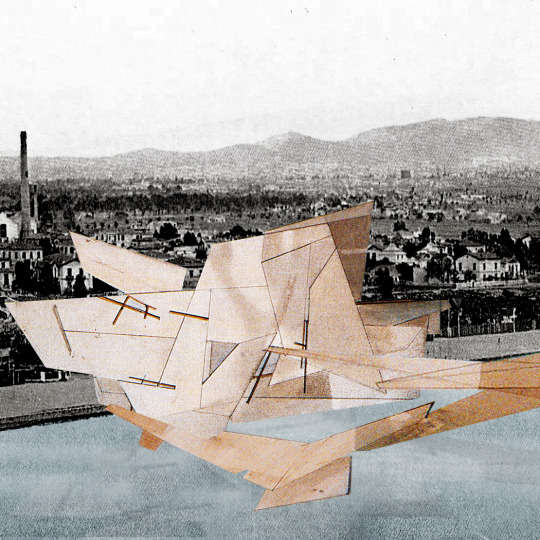#Guy Lafranchi
Photo

“Mercato Boeri-Zucchi-Lafranchi” _ 17.04.2023 _ SK
Image sources:
1. Project P#088, “Malama Learning Centre”, Hawai, Kapolei _ From: Lafranchi, G. (2004). Urbanomad, Wien: Springer-Verlag.
2. Infussi, F. (1997). Πρόγραμμα Ηρακλής: Δέκα Σχέδια για την Ελληνική Πόλη _ «Παρέμβαση στην Πόλη» (Μάϊος 1997), σελ. 219 _ Αρχιτέκτονες: Stefano Boeri & Cino Zucchi _ Έκθεση: 23.05.1997-07.06.1997.
https://www.politeianet.gr/books/9789608601406-sullogiko-aget-iraklis-programma-iraklis-deka-schedia-gia-tin-elliniki-poli-6122
#Mercato Boeri-Zucchi-Lafranchi#Stefano Boeri#Cino Zucchi#Guy Lafranchi#Malama Learning Centre#Πρόγραμμα Ηρακλής#Δέκα Σχέδια για την Ελληνική Πόλη#Παρέμβαση στην Πόλη#Francesco Infussi#Spyros Kaprinis#1997#2023#Urbanomad#P088#2004#Ανατοπισμός#Κολλάζ#Αρχιτεκτονική#Σύνθεση#Anatopism#Architecture#Collage#Σπύρος Καπρίνης
3 notes
·
View notes
Text
Can Tillerson steer US foreign policy into calmer waters?
Howard LaFranchi, CS Monitor, February 3, 2017
WASHINGTON--When Rex Tillerson arrived an hour late to his first day on the job as secretary of State Thursday, he told assembled State Department employees that the National Prayer Breakfast he’d attended was to blame.
It seemed that “this year,” he said in his Texas drawl, “people felt the need to pray a little longer.”
Perhaps Mr. Tillerson felt the need for a little extra prayer himself.
With the president who nominated him badgering allies over the phone and on Twitter, with hundreds of diplomats signing a “dissent channel” memo to express their dismay at recent executive orders on immigration and refugees--moreover, with a national security team in place at the White House that seems primed to bypass and overrule anything the State Department might advise--the nation’s new top diplomat faces an almost impossibly complex and daunting job.
“It’s practically unprecedented, the situation he’s coming into, at the department itself and then with everything President Trump has managed to put on the table in just two weeks,” says Wayne White, a former US diplomat who was deputy director of the State Department’s Middle East intelligence office.
Most of the State Department’s 75,000 employees at home and abroad just want to do their jobs effectively and will look to Tillerson for direction and inspiration, Mr. White says. But he adds that whether “the new guy,” as Tillerson dubbed himself Thursday, is just a good manager largely sidelined in foreign-policy making, or a commanding force globally, will depend largely on the relationship he develops with the White House.
“How he manages to work with Trump & Co.--that will determine his strength, both in the building and outside around the world,” White says.
No one doubts the former ExxonMobil CEO’s management skills, his ability to move smoothly in powerful circles, or his know-how in cutting international deals. As Tillerson puts it: When Mr. Trump picked him--a lifelong businessman with no formal diplomatic experience--his wife, Renda, told him: “You didn’t know it, but you were in a 41-year training program for this job.”
Tillerson also takes his new job with less than robust support in Congress, having squeaked through the Senate on a 56-43 confirmation vote--the narrowest for a secretary of State in at least a half-century.
But while developing a working relationship with Congress and managing the State Department may be one thing, experts say, imposing oneself at the White House and carrying the day on policy is quite another.
“The most important factor in determining if a secretary of State will be successful or not is his or her relationship with the president,” says Karl Inderfurth, a former assistant secretary of State for South Asian affairs. “Without that strong tie, the secretary ends up an outlier on policymaking.”
But almost as important, he adds, is the secretary of State’s relationship with the foreign policy advisers the president has chosen to surround him on a daily basis.
“The key to Tillerson’s effectiveness with the president will be his relationship with the national security staff,” says Mr. Inderfurth, who is now an adjunct professor at the Johns Hopkins School of Advanced International Studies in Washington. “How is Tillerson going to create the absolutely essential relationship with President Trump when there are those closer to the president with stronger and sometimes extreme views that they want to see carry the day?”
Tillerson’s moderately drawn-out confirmation effort gave Trump time to build and consolidate a White House national security team that looks to many experts like Fort Knox--not so easy to penetrate. Early White House decisions and priorities suggest four principal players are setting the agenda: retired Lt. Gen. Michael Flynn, the national security adviser; Trump’s domestic political adviser, Steve Bannon--whom Trump elevated to a permanent seat on the National Security Council with an executive order; and Trump’s son-in-law, Jared Kushner.
Trump’s chief of staff, Reince Priebus, completes the quartet of key advisers, close White House observers say.
General Flynn made it clear he intends to handle Iran policy when he publicly put Iran “on notice” this week over its ballistic missile testing and the White House announced Friday new sanctions on Iran. Mr. Kushner is said to have put dibs on Mexico affairs and Israeli-Palestinian issues.
It certainly isn’t unheard of for the secretary of State to be the odd man out in foreign-policy making--just ask Colin Powell, who was sidelined to the State Department while the White House national security team plotted war on Iraq. President Nixon’s first secretary of State, William Rogers, “was totally out of the loop on the breakthrough with China until after it happened,” Inderfurth notes.
The Trump White House has also wasted little time in airing its disregard for the State Department and its thousands of nonpolitical foreign-service officers. When nearly 1,000 US diplomats signed a “dissent channel” memo expressing their opposition to Trump’s orders suspending refugee resettlement and placing a temporary travel ban on seven Muslim-majority countries, White House reaction was swift and public.
“I think they can either get with the program or go,” White House spokesman Sean Spicer told reporters at a White House briefing, either unaware or unimpressed that the dissent channel is a decades-old provision for career diplomats to express disagreement with policy.
Another challenge Tillerson faces as America’s top envoy to the world is Trump’s attack-dog approach to other leaders, including some allies. The president sent shock waves around the world this week when he got belligerent with Australian Prime Minister Malcolm Turnbull over an Obama administration refugee agreement and then abruptly ended their phone call. Earlier Trump told Mexican President Enrique Peña Nieto over the phone that he might send US troops across the border if Mexico didn’t round up its “bad hombres” on its own.
With much of the world rattled by Trump’s “tough” style, Tillerson might want to set off overseas soon to smooth ruffled feathers. But Inderfurth cautions the new secretary of State against too much time out of Washington--and away from the White House--if he wants to play a determining role in steering US foreign policy.
“Tillerson is going to need to do a reassurance swing through Europe and with other key allies, but he’ll also have to keep in mind that while he’s away, the White House mice will play,” he says. “Everyone who knows Trump says the last person he speaks to is the most influential on a decision, so it will work against Tillerson if he’s not only not in the White House, but often out of town.”
0 notes
Photo



“Lafranchi Pier”, Neo Faliro, Athens, Greece _ 17.04.2023 _ SK
Image sources:
1. Project P#096, “New York-Normandy Atlantic Bridge”_ From: Lafranchi, G. (2004). Urbanomad, Wien: Springer-Verlag.
2. Infussi, F. (1997). Πρόγραμμα Ηρακλής: Δέκα Σχέδια για την Ελληνική Πόλη, σελ. 57_ Έκθεση: 23.05.1997-07.06.1997.
https://www.politeianet.gr/books/9789608601406-sullogiko-aget-iraklis-programma-iraklis-deka-schedia-gia-tin-elliniki-poli-6122
#Lafranchi Pier#Guy Lafranchi#Neo Faliro#Athens#Greece#New York#Normandy#Atlantic#Bridge#P096#Urbanomad#Πρόγραμμα Ηρακλής#Francesco Infussi#1997#2004#Spyros Kaprinis#Anatopism#Architecture#Collage#Ανατοπισμός#Αρχιτεκτονική#Σύνθεση#Κολλάζ#2023#Σπύρος Καπρίνης
5 notes
·
View notes